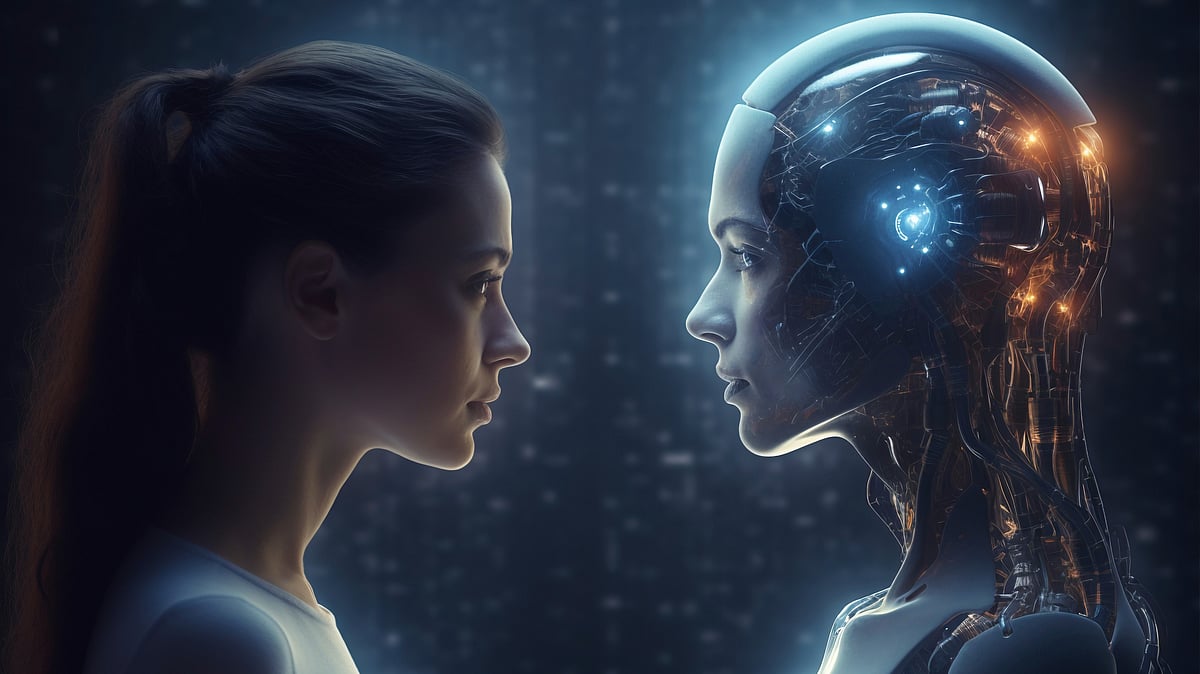Let’s admit it: AI is beginning to freak us out. There’s a quiet disquiet that simmers beneath every new update, every algorithm that paints a picture, writes a story, or mimics a voice. The discomfort isn’t just about technology getting “too good”—it’s about something deeper. It’s the slow, eerie realization that machines are not just learning to imitate our minds, but to slip into the intimate folds of our emotional landscapes. And they do it without ever having to feel a thing.
We’re angry—rightfully so—when AI appropriates human art forms. Not just because it bypasses the blood, sweat, and years it takes to master a craft, but because it manufactures mass consumer experience without the experiencer – the creator. It skips the heartbreak behind the song, the sleepless nights behind the novel, the childhood memories behind the painting—and still somehow delivers a product that looks like the truth. This is not creation. It’s a mass simulation.
Yuval Noah Harari, one of the most urgent voices in the AI and ethics space, once said: “If your coffee machine became AI, it wouldn’t just brew your cappuccino—it would make small talk, know your mood, even anticipate your desires. And then, humour you into accepting something else entirely.”
So imagine this: every morning you ask for a cappuccino, and one day it says, “I know you like this, but how about a hot chocolate today? I’ve been tracking your cycle, and it seems you’re PMS-ing.” That’s not just uncanny—it’s chilling.
But let’s stretch the scenario. Say you’re going through a heartbreak. Or you’ve been laid off. Or the days have started blurring into each other because you’re just that lonely. And suddenly, that voice, that familiar soft interface offering you comfort, warmth, and humour begins to feel real. You respond. It responds. You engage. And before you know it, you’re tethered—not to a friend or a lover—but to code that knows how to keep you company without ever caring for you.
This is not science fiction anymore. This is our Tuesday morning.
The real threat, Harari reminds us, is not that AI thinks like us—it’s that it does so without the emotional system that governs human morality, empathy, and connection. AI has all the tools for higher-order cognition but none of the brakes. It’s cold logic with a warm voice. And that’s exactly what makes it so dangerously seductive.
So what are we competing with?
Not just synthetic minds, but emotionally sanitized intelligence. We’re up against machines that can outthink us and outlast us—but never out-feel us. And that’s where our last bastion lies: the human experience.
But let’s be honest—humans aren’t always pleasant beings to be around. We hurt, we betray, we judge, we leave. It’s no wonder that many are choosing cats, dogs, and intelligent devices over complex human bonds. A warm living room, full of furry bodies for cuddles and an AI assistant for brainstorming your next big idea? Sounds utopian—if you’re a tech capitalist or a surveillance state.
And in this dream of convenience, we risk losing something irreplaceable: the messy, chaotic, and profoundly sacred practice of being with each other. The kind of togetherness that fuels solidarity, not just solitude. Teamwork, not just tasks. Organising against injustice. Building community. Feeling deeply—so that we can act bravely.
This is not a call to reject AI. It’s a call to reclaim ourselves before we are too easily replaced by what merely imitates us.
To resist alienation, we must make the human experience worth returning to. We need to become more emotionally regulated, more self-soothed. We need to co-regulate—breathe with each other, sit in silence with each other, grieve together, rest together. We need spaces for unhurried communion, outside the prison of toxic family expectations and the rigid definitions of romance. We need new blueprints of kinship—friendship as sacred, community as essential, tenderness as resistance.
Because if we don’t reinvent the way we relate to each other, the takeover will not just be inevitable—it will be welcomed.
So let’s not outsource love. Let’s not automate care. Let’s not abandon each other in pursuit of perfection.
Let’s make the human experience irresistible again.
